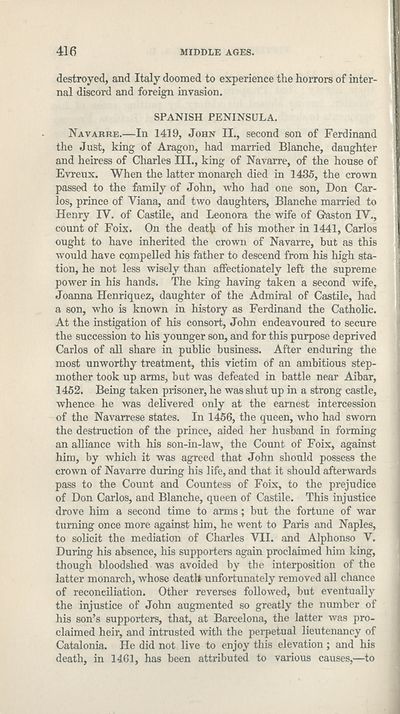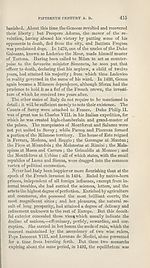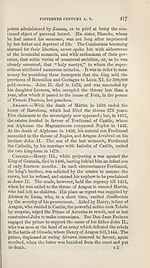Download files
Complete book:
Individual page:
Thumbnail gallery: Grid view | List view

416
MIDDLE AGES.
destroyed, and Italy doomed to experience the horrors of inter¬
nal discord and foreign invasion.
SPANISH PENINSULA.
Navarre.—In 1419, John II., second son of Ferdinand
the Just, king of Aragon, had married Blanche, daughter
and heiress of Charles III., king of Navarre, of the house of
Evreux. When the latter monarch died in 1435, the crown
passed to the family of John, who had one son, Don Car¬
los, prince of Viana, and two daughters, Blanche married to
Henry IY. of Castile, and Leonora the wife of Gaston IV.,
count of Foix. On the death of his mother in 1441, Carlos
ought to have inherited the crown of Navarre, but as this
would have compelled his father to descend from his high sta¬
tion, he not less wisely than affectionately left the supreme
power in his hands. The king having taken a second wife,
Joanna Henriquez, daughter of the Admiral of Castile, had
a son, who is known in history as Ferdinand the Catholic.
At the instigation of his consort, John endeavoured to secure
the succession to his younger son, and for this purpose deprived
Carlos of all share in public business. After enduring the
most unworthy treatment, this victim of an ambitious step¬
mother took up arms, but was defeated in battle near Aibar,
1452. Being taken prisoner, he was shut up in a strong castle,
whence he was delivered only at the earnest intercession
of the Navarrese states. In 1456, the queen, who had sworn
the destruction of the prince, aided her husband in forming
an alliance with his son-in-law, the Count of Foix, against
him, by which it was agreed that John should possess the
crown of Navarre during his life, and that it should afterwards
pass to the Count and Countess of Foix, to the prejudice
of Don Carlos, and Blanche, queen of Castile. This injustice
drove him a second time to arms; but the fortune of war
turning once more against him, he went to Paris and Naples,
to solicit the mediation of Charles VII. and Alphonso V.
During his absence, his supporters again proclaimed him king,
though bloodshed was avoided by the interposition of the
latter monarch, whose death unfortunately removed all chance
of reconciliation. Other reverses followed, but eventually
the injustice of John augmented so greatly the number of
his son’s supporters, that, at Barcelona, the latter was pro¬
claimed heir, and intrusted with the perpetual lieutenancy of
Catalonia. He did not live to enjoy this elevation; and his
death, in 1461, has been attributed to various causes,—to
MIDDLE AGES.
destroyed, and Italy doomed to experience the horrors of inter¬
nal discord and foreign invasion.
SPANISH PENINSULA.
Navarre.—In 1419, John II., second son of Ferdinand
the Just, king of Aragon, had married Blanche, daughter
and heiress of Charles III., king of Navarre, of the house of
Evreux. When the latter monarch died in 1435, the crown
passed to the family of John, who had one son, Don Car¬
los, prince of Viana, and two daughters, Blanche married to
Henry IY. of Castile, and Leonora the wife of Gaston IV.,
count of Foix. On the death of his mother in 1441, Carlos
ought to have inherited the crown of Navarre, but as this
would have compelled his father to descend from his high sta¬
tion, he not less wisely than affectionately left the supreme
power in his hands. The king having taken a second wife,
Joanna Henriquez, daughter of the Admiral of Castile, had
a son, who is known in history as Ferdinand the Catholic.
At the instigation of his consort, John endeavoured to secure
the succession to his younger son, and for this purpose deprived
Carlos of all share in public business. After enduring the
most unworthy treatment, this victim of an ambitious step¬
mother took up arms, but was defeated in battle near Aibar,
1452. Being taken prisoner, he was shut up in a strong castle,
whence he was delivered only at the earnest intercession
of the Navarrese states. In 1456, the queen, who had sworn
the destruction of the prince, aided her husband in forming
an alliance with his son-in-law, the Count of Foix, against
him, by which it was agreed that John should possess the
crown of Navarre during his life, and that it should afterwards
pass to the Count and Countess of Foix, to the prejudice
of Don Carlos, and Blanche, queen of Castile. This injustice
drove him a second time to arms; but the fortune of war
turning once more against him, he went to Paris and Naples,
to solicit the mediation of Charles VII. and Alphonso V.
During his absence, his supporters again proclaimed him king,
though bloodshed was avoided by the interposition of the
latter monarch, whose death unfortunately removed all chance
of reconciliation. Other reverses followed, but eventually
the injustice of John augmented so greatly the number of
his son’s supporters, that, at Barcelona, the latter was pro¬
claimed heir, and intrusted with the perpetual lieutenancy of
Catalonia. He did not live to enjoy this elevation; and his
death, in 1461, has been attributed to various causes,—to
Set display mode to:
![]() Universal Viewer |
Universal Viewer | ![]() Mirador |
Large image | Transcription
Mirador |
Large image | Transcription
| Antiquarian books of Scotland > Education > Elements of universal history on a new and systematic plan > (436) |
|---|
| Permanent URL | https://digital.nls.uk/127585372 |
|---|
| Description | Thousands of printed books from the Antiquarian Books of Scotland collection which dates from 1641 to the 1980s. The collection consists of 14,800 books which were published in Scotland or have a Scottish connection, e.g. through the author, printer or owner. Subjects covered include sport, education, diseases, adventure, occupations, Jacobites, politics and religion. Among the 29 languages represented are English, Gaelic, Italian, French, Russian and Swedish. |
|---|

